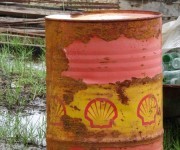Overnight, Nigeria went from being a British colony to being owned by Shell oil.Photo: Kendra E. ThornburyFilmmaker Sandy Cioffi went to the Niger Delta — Nigeria’s oil-rich southern region — in 2005 intending to document the construction of a library in a small village there. But something about the effort smelled foul to her; it smacked of the type of empty philanthropy that’s carried out by well-intentioned but misguided volunteers and backed by controlling interests hoping to distract or make up for deeper, systemic exploitation. Fifty years of oil extraction in the delta has polluted the region’s ecosystem to the point where what should be a vibrant equatorial swampland humming with life is now a silent dead zone where human life expectancy hovers around 40.
As Cioffi took all of this in, she also earned the trust of a few local college students, politically savvy young men who, as Cioffi puts it, “were getting that I get it.” So she decided to take advantage of the rare press access she’d been granted as part of the library filmmaking team and return to the area, supposedly to follow up on the library’s progress. “I flat-out lied,” she said. “I felt I needed to film in that moment, because I had access. No one had made a documentary about the Niger Delta in years, and it’s not because they didn’t want to, it’s because nobody could get a visa or press passes to get in. I was the only person in the delta with a camera legally.”
Sweet Crude, the film that resulted from Cioffi’s stealth return, documents the effect the oil industry has had on the political and human destiny of the Niger Delta. Since its release in 2009, Sweet Crude has racked up dozens of selections and awards at festivals across the world. Now that it’s out on DVD, we got a chance to screen it here at the Grist office, before sitting down with Cioffi for some background.
Q. How did you come to realize that the film you needed to make was not about building a library?
A. It was pretty gross to me to see all of the outpouring of resources from oil companies, from the American embassy, from all the sort of high-and-mighty and, as it turns out, quite corrupt Nigerian officials, who all wanted a piece of looking like they were for this library effort. Why should we be bringing the books that children in a Nigerian village are going to be reading? I mean, billions of dollars of oil under your feet — all they need is for us to get out of the way of their political destiny. I tried very hard to make a film that, without being an anti-philanthropy film, would be clear that I wasn’t looking at the people there as victims or perpetrators; I was trying to look at them as complicated people, like any of us are.
Q. What role does the oil industry play in Nigerian politics?
A. If you look at the amount of untapped oil that’s still there, not only is it untapped, but it’s also sulfur-free, which makes it incredibly valuable because you don’t have to process it. That’s why it’s called sweet crude. To an oil company, it’s liquid gold.
It’s impossible to discuss situations like the Niger Delta in a context that isn’t also immediately about the 50-year history of colonialism being turned into corporatism. Nigeria’s probably the most perfect example of a place that never had a shot because they overnight went from being a British colony to being owned by Shell Oil. We always talk about [the Biafran War in the Niger Delta] in what I consider to be fairly racist terms — look at all those crazy Africans fighting each other because of their tribal issues — well, those were ethnic tensions that were intentionally manipulated, first by the British and then by oil companies.
During the Cold War and during the beginning of what was the U.S. blueprint for how to deal with the Middle East, we always looked at Nigeria as our safe oil piggybank. We’ve got that covered with just a few moves of the chess pieces. What the CIA was really good at in Africa was [making sure] that markets around resources like oil would be just chaotic enough. They haven’t been very good at picking the right dictator in many cases, or propping up the right rebels, but what they’ve been very good at is managed chaos.
If you want to see what an unregulated energy industry looks like, go to Nigeria.
Q. What does it look like?
A. I mean, you’re standing in a place where you really feel like you’re in a Mad Max film. You’re looking at the future of what we’ve done. We couldn’t eat any of the food from there, even if we want always to be low-impact — we had to bring in all MRE meals, because we couldn’t eat anything that’s grown there. My cameraman meant to be nice and he ate a little bit of fish at a family’s house, and he was so violently ill I almost had to airlift him out. [My crew members were] laboring in just walking because of how incredibly foul the air is, and that’s just from all the gas flaring.
To live with the people who have been living with the real price of oil changes you. So few Americans have paid the price of oil. Over my lifetime is really the time period when America became this arrogant economy that thought we had it all figured out. But it wasn’t just real estate markets and bonds. The cost of energy was the real house of cards all along.
Q. Sweet Crude traces the efforts of the Movement for the Emancipation of the Niger Delta, or MEND, the insurgent group founded by the students you initially connected with. Some the film’s most maddening moments come when we see raw footage of an ABC interview with a MEND leader, who repeatedly denies the group’s involvement in terrorist activity, followed by the finished story that aired under the slug “The New African Terror Threat.” This broadcast misrepresented MEND at the time, but the group has resorted to armed resistance since then. Given their situation, do you think that was the best, or only, option for MEND to achieve its goals?
A. That question is supposed to be a central operating question in the narrative of Sweet Crude. [I’m] trying to say to the audience, it’s not my right to answer this, but it’s my duty to be troubled by the question. I could argue that the consequences of choosing a violent path are not working out for them. That said, they reduced oil production in Gbaramatu Region by upwards of 50 percent, and Gbaramatu Kingdom is in better shape than most of the rest of the Niger Delta. But without a certain amount of international attention, the criminalization is inevitable, because it’s inevitable in any movement — just look at the IRA, or the ANC in South Africa. At some point, when they had enough world attention, the more political element of [the] movement was enough to become the larger part of it. That’s putting in one sentence what was a lot of decades of hard work. But when the world community is not involved … you end up with another gang of thugs, which is quite honestly what MEND has become.
Q. What gives you hope for the future after spending so much time immersed in this dire situation?
A. My cheesy answer, but it’s real, is young people, my students. If you do polling on almost every issue I care about, you would think that I’m 22, because that’s where all of my answers land. I mean, take gay marriage, for example. Most [22-year-olds] look at you, like, why is that even a conversation we’re having?
The other upside is, if you really look at it, the terrible bad guys wouldn’t be fighting so hard if they thought they’d already won. Oil companies would not spend the money they do on their public image if we weren’t doing our jobs. So we can feel good about that; we can feel good that young people by and large are already right there. They’re very disappointed in their elders, as well they should be, and I’m trying to just be somebody that young people can look to on some level to provide some sense of leadership.
As a documentary filmmaker, I don’t think that it’s helpful to say, “You should write this one letter to your congressman.” People check it off their list, like, “I saw Sweet Crude and I thought about Nigeria, check.” I wanted to get deeper under your skin, to make something that would [make you] think there’s still something worth defending. It’s almost always true that there’s something in [every issue] that if [regular people] knew it means children’s legs being blown off in a land mine in Honduras, there’s no way they’d allow it. If you could simply bring home footage that made it clear in someone’s church basement that those regular, everyday choices actually mean this in this human being’s life, then I really do think you’d see people change. I think it comes down to how removed people are from the consequences of their choices. That really is what allows malevolence to progress, in almost every corner of the world.




